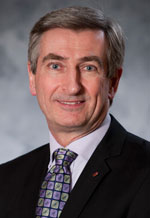 Dr. Robert MacGregor
Dr. Robert MacGregor
As my presidency comes to an end, I reflect on the many interactions and discussions I've had with colleagues across Canada. One topic that was raised frequently was professionalism and the declining trust the public has in the dental profession. This issue was identified by CDA during regular environmental scanning several years ago and was recently confirmed by public opinion research conducted by Ipsos and coordinated by the national Branding Working Group in 2010.
Before discussing the concept of professionalism, we need to remember the definition of a profession: "a collection of expert service providers who have jointly and publicly committed to always give priority to the existential needs and interests of the public they serve above their own, and who in turn are trusted by the public to do so."1 As health care providers, we must always place the patient's well-being first and deliver treatment that provides optimal oral health. If this level of health has been achieved, further esthetic improvements can then be provided—at the request of the patient.
The Ipsos research findings indicate that the public does not view esthetic services as health care. Excessive promotion of such procedures can generate or reinforce distrust in dentistry, especially if a dentist recommends procedures that are unnecessary. Indeed, the research revealed that public trust in the profession is waning, with only 9% of patients surveyed "completely agreeing" that they trust dentists. The public's faith in dentists must be elevated if the social contract between the profession and the public is to be sustained.
Another cause for concern is the finding that 63% of patients surveyed agreed that "dentists are business people," while only 57% agreed that "dentists are doctors." The reality is that we are both health care providers and business people who derive income from the delivery of care. While practice management courses may be helpful in running an efficient practice, these programs should also emphasize efficient, optimal patient care as a priority. Our primary focus should always be on the patient's best interests.
At a consultative forum on professionalism convened by CDA in 2011, the consensus was that all segments of the profession need to take responsibility for raising our level of professionalism. This can start with the students we select for our dental schools, continue through the formal education years and be reinforced during our time in practice. To this end, CDA is currently working with the Association of Canadian Faculties of Dentistry to re-examine the selection process for dental school applicants. The goal is to identify students who exhibit traits of ethical and professional behaviour and to encourage this behaviour prior to graduation.
As practising dentists, we can all do our part to build a trusting relationship with our patients. It can often be as simple as taking the time to communicate treatment procedures, options and recommendations. Effective communication can help patients make informed decisions, while also building a sense of trust and value.
We are all fortunate to be part of such a wonderful profession. We enjoy the benefits of being professionals, but that also comes with responsibilities. Let's not overlook these obligations and try to do what is right for our patients and the profession.
Reference
- Welie JV. Is dentistry a profession? Part 1. Professionalism defined. J Can Dent Assoc. 2004;70(8):529-32.
